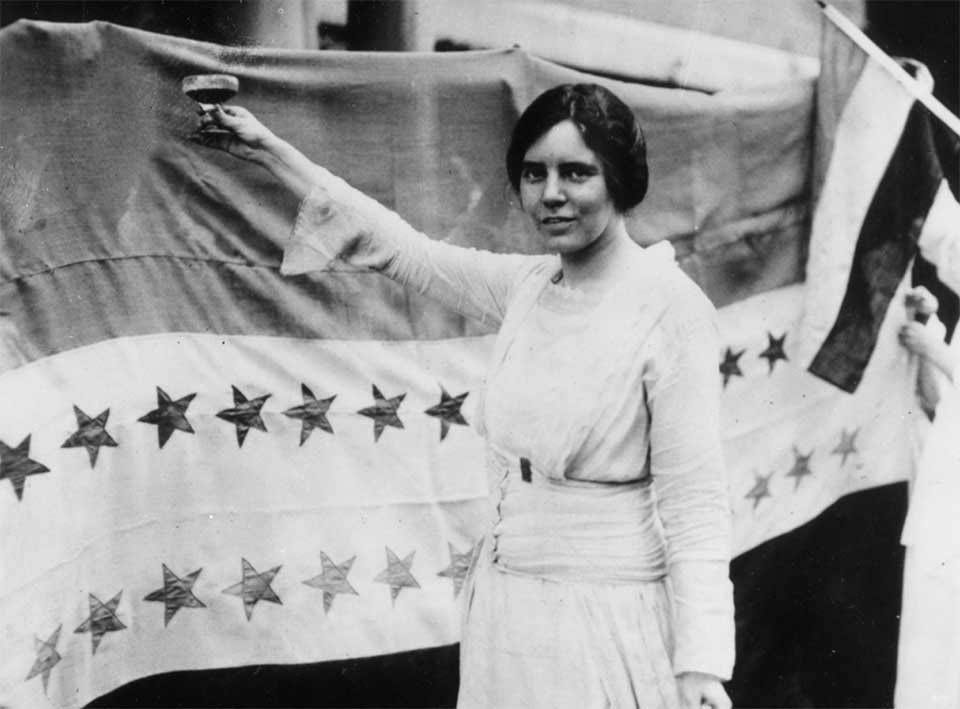Alice Paul Family Equal Rights Amendment Alice Paul
Alice Paul and the Fight for Equal Rights

Born 37 years after the first Woman's Rights Convention, held in Seneca Falls in 1848, Alice Paul became a leading advocate for women's suffrage and the passing of the 19th Amendment. Afterwards attending Swarthmore College, co-founded by her grandpa, Paul went away and became engaged in the women's suffrage move.
Upon returning to the U.S. in 1912, Alice Paul joined the National American Woman Suffrage Association (NAWSA). Paul went on to course her own organization the National Adult female'due south Political party which was focused on lobbying Congress for a national subpoena rather than the land-past-land campaigns endorsed by NAWSA. With the National Woman's Party, Paul organized a 1913 protest the solar day before President Wilson's inauguration, attended by over 8,000 women. Afterward Wilson's reticence to back up women'due south suffrage, Paul continued to organize protests during his presidency, including the "Silent Sentinels."
The Sentinals included Alice and 1,000 other women who took turns picketing the White House for a twelvemonth. Eventually many picketers, including Paul, were arrested for "obstructing traffic." Those arrested were sent to a workhouse prison in Virginia where they faced harsh weather and organized hunger strikes. News effectually the suffragists in prison somewhen swayed public opinion in their favor and led to President Wilson's public support of suffrage in 1918.
Following the passage and ratification of the 19th Subpoena in 1920, many saw the work of the suffragists as complete; but, Alice Paul began writing another amendment, assertive the desired equality of the Suffrage movement not still fully realized. In 1923 on the 75th Anniversary of the Seneca Falls Convention, Alice Paul wrote the Lucretia Mott Amendment which would subsequently become known equally the Equal Rights Amendment (ERA). Since its inception in 1923, the ERA was introduced in every Congress until information technology passed both the Business firm and Senate in 1972.
In 1943, the Lucretia Mott Amendment was revised to its electric current state, renamed the ERA and adopted by both the Autonomous and Republican political party platforms. The subpoena continued to accept bipartisan support, passing with support from 78% House Republicans and 84% Senate Republicans in 1972. By the end of the decade, support for the ERA became increasingly partisan, with 2d-wave feminists and the "women'south vote" flocking to the Autonomous Party, while Phyllis Schlafly's End (End Taking Our Privileges) movement gaining back up from the religious right and Ronald Reagan'south 1980 presidential platform.
When the ERA was passed in 1972, Congress included a ratification deadline of 1979, which was extended past a Autonomous controlled Congress to 1982. Past 1982, 35 states ratified the ERA, iii states shy of the needed 38. This year , Virginia became the 38th land to ratify the ERA and the House of Representatives removed the time limit for ratification. The contempo ratification has brought renewed involvement and questions surrounding the ERA and the land of women's equality in the U.South.
When writing the subpoena, Alice Paul said on the topic, "if nosotros go on on this way they will be celebrating the 150th anniversary of the 1848 Convention without being much further advanced in equal rights than we are […] we shall not be safe until the principle of equal rights is written into the framework of our government." Now as we celebrate the suffrage centennial and the 172nd Anniversary of the Seneca Falls convention, women take yet to proceeds constitutional equality in the U.Due south, women brand up less than a quarter of all elected officials in the U.Southward. and it remains essential we address the continued inequalities and disadvantages women face.
The Seneca Falls Revisited virtual briefing, hosted by Civically Re-Engaged Women (Coiffure), will address the significance of the many women who have come before us and the work still to exist done to achieve equal opportunity for women including calls for constitutionally guaranteed gender equality started past Alice Paul nearly a century agone. If you are interested in joining the celebration and move visit Crewomen.com to annals for this summer'due south virtual conference.
Briefing Countdown: Expect out for these three speakers who will be a office of the virtual conference in July.

Frederick Douglass' descendant, Kenneth B Morris Jr, is active in the motility for women's equality in 2020 and is a co-chair of Seneca Falls Revisited, the multi-year conference commemorating the Centennial of Suffrage organized by Sharon Nelson and the team at CREW (Civically Re-Engaged Women). To read more about Ken'due south work click here, to support this vital work look for #SenecaFallsRevisited & #Crew on social media platforms.
Michele Jones Galvin, the three times not bad 1000-niece of Harriet Tubman and co-author of Beyond the Underground: Aunt Harriet, Moses of Her People, will exist serving equally a legacy co-chair of the Seneca Falls Revisited Conference this Summertime.
Gale Brewer, a onetime fellow member of the New York City Council, currently serves every bit the 27th Borough President for Manhattan. Brewer will be a speaker on the beginning day of the 2020 Seneca Falls Revisited "The Vote" Briefing. Find out more about Gale Brewer and her role as Borough President here.
Source: https://medium.com/@representwomen/alice-paul-and-the-fight-for-equal-rights-e56d42c07f64
0 Response to "Alice Paul Family Equal Rights Amendment Alice Paul"
Post a Comment